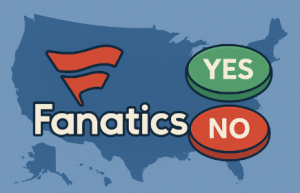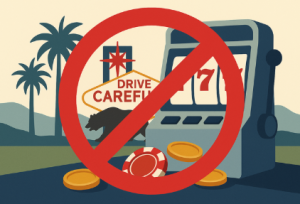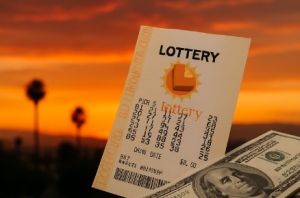Legal Gambling News, Updates, and Analysis
Latest News
New York Says “No More” to Sweepstakes Casinos—Gov. Hochul Just Signed the Ban
December 17, 2025 |Governor Kathy Hochul has signed S5935A into law, officially banning the entire "sweepstakes gaming" model—including popular online casino and sports betting platforms using virtual coins for real prizes—reinforcing New York's [...]
Hello Millions Adds a Chilly New Slot: Polar Buffalo Extreme Hold and Win 25,000
December 17, 2025 |Hello Millions introduces Polar Buffalo Extreme Hold and Win 25,000, a winter-themed slot with high volatility, expanding bonus grids, and big win potential.
Bonus Power Index December Update: Key Ranking Changes
December 16, 2025 |Following a market trend, Chanced, Global Poker, and Punt.com have eliminated their free sign-up bonuses, while newcomer Yotta Casino is differentiating itself by offering new players a variable "Mystery Box" [...]
The Christmas Slots You Actually Want To Play This Year
December 16, 2025 |From cozy classics to high-volatility jackpot games, here are the best Christmas-themed online slots to play this holiday season.
Playtech Missions Coming to McLuck, PlayFame, Hello Millions & Spin Blitz
December 11, 2025 |Discover December’s Playtech Missions at four top sweeps casinos. McLuck, PlayFame, Hello Millions & Spin Blitz offer new challenges, rewards and fresh games.
RubyPlay In-House Tournament: Win a Luxury Aspen Getaway on McLuck, Hello Millions, & More
December 9, 2025 |Running from December 10-16, the RubyPlay In-House Tournament challenges players to score the highest single-round multiplier on featured slots for a share of the Free SC 7,000 prize pool and [...]
FanDuel Casino Launches Exclusive Love Island Slot
December 9, 2025 |FanDuel Casino debuts its exclusive Love Island slot, kicking off a new multi-game partnership. Here’s how the villa vibes are coming to iGaming.
Fanatics Debuts Prediction Market Product in Multiple US States
December 9, 2025 |Following a fast exit from Nevada, Fanatics jumped into the prediction market business by launching "Fanatics Markets"—a platform for trading event contracts in sports, politics, and economics—across 10 states, immediately [...]
Industry News
Caesars’ Q3 Earnings Take A Dip As Las Vegas Visitors Drop
November 4, 2025 |Caesars Entertainment's Q3 earnings revealed a 10% decline in crucial Las Vegas revenue, driven primarily by a drop in international and domestic tourism, despite growth in its regional casino and digital segments.
ACE Casino Makes a Comeback as California Cracks Down on Sweepstakes Gaming
October 29, 2025 |After ghosting a few states earlier this year, sweepstakes casino platform ACE has reappeared in Tennessee, Alabama, Georgia, and Maryland, a comeback move that says one thing loud and clear: they’re not giving up the game just yet. So why the sudden U-turn? Simple math, survival, and desperation. California, which makes up nearly 20% of the […]
Pragmatic Play Pulls Out of US Sweepstakes Market Amidst Regulatory Crackdown
September 2, 2025 |Due to a challenging regulatory environment and a civil lawsuit in California, major iGaming provider Pragmatic Play has ceased supplying its games to US sweepstakes operators, marking a significant shift in the industry's landscape.
MGM and Caesars Expect $300M in Tax Savings Via One Big Beautiful Bill
August 6, 2025 |The "One Big Beautiful Bill," is set to provide over $300 million in tax savings for casino giants like MGM and Caesars, while its controversial cap on gambling loss deductions sparks an outcry from professional gamblers.
Evolution Expands Partnership with PokerStars, Becomes Sole Provider of Live Casino Games
July 30, 2025 |PokerStars has expanded its partnership with Evolution AB, making Evolution its exclusive live casino provider in North America
GOP Heavyweight Joins Push to Reverse Gambling Loss Cap in “Big Beautiful Bill”
July 30, 2025 |A top House Republican is backing efforts to restore the full deduction for gambling losses, joining a growing list of lawmakers and industry leaders calling for changes to President Donald Trump’s “One Big Beautiful Bill.” Rep. Jason Smith (R-MO), chair of the influential House Ways and Means Committee, said at a recent field hearing in […]
CVC Capital Partners Acquires Gaming Laboratories International As Demand For Compliance Testing Grows
July 23, 2025 |Private equity firm CVC Capital Partners is acquiring Gaming Laboratories International (GLI), a prominent provider of testing and compliance services for the gaming industry, along with its affiliates, with the acquisition process expected to finalize by July 31, 2025.
US Onlines Casinos Bring in $898.1 million in Revenue
July 7, 2025 |The seven states where you can play online casino games pulled in nearly $900 million—specifically, $898.1 million in gross revenue. That’s a 33.1% jump from the $674.9 million they made [...]
Legal, Lawsuits, & Crime
Commodity Futures Trading Commission Abandons Its Election-Betting Case Against Kalshi
May 7, 2025 |The CFTC's enforcement stance has changed under the Trump administration, and it will no longer oppose Kalshi's US political offerings.
County Court Rules Redeveloped ‘Queen of Virginia’ Skill Game Machines are Legal
April 28, 2025 |The debate over skill game machines in Virginia has taken another turn after a county judge ruled that the Queen of Virginia games are legal.
MGM Agrees to $8.5M Settlement in Nix, Bowyer Investigation
April 22, 2025 |MGM Resorts reached a proposed settlement for $8.5 million with the (NGCB), following an investigation for illegal bookmaking.
Florida Officer Arrested, Accused of Sharing Confidential Info with Hard Rock Bomb Scare Suspect
April 16, 2025 |Sheriffs arrested a Florida police officer over allegations he provided confidential information to the suspect in the Hard Rock bomb scare.
Social and Promotional Games Issues Celebratory Statement Following Failure of Three Anti-Sweeps Bills
April 9, 2025 |Three attempts by states to ban sweepstakes casinos have failed in the past two weeks and the industry's trade group is overjoyed.
City of Baltimore Sues DraftKings and FanDuel Under Municipal Consumer Protection Ordinance
April 8, 2025 |The City of Baltimore is suing DraftKings and FanDuel over "deceptive" practices it says target and exploit at-risk residents.
Legislative News
New York Says “No More” to Sweepstakes Casinos—Gov. Hochul Just Signed the Ban
December 17, 2025 |Governor Kathy Hochul has signed S5935A into law, officially banning the entire "sweepstakes gaming" model—including popular online casino and sports betting platforms using virtual coins for real prizes—reinforcing New York's commitment to a tightly controlled, regulated gambling market.
New York Sweeps Casino Ban Sent to Gov. Hochul as Deadline Nears
December 4, 2025 |A bill banning online sweepstakes casinos is now on Gov. Hochul’s desk, with a Dec. 31 deadline to sign or veto.
California Bans Sweepstakes Casinos with AB 831: What It Means for Players & Operators
October 14, 2025 |California’s new law, AB 831, signed by Governor Newsom, bans sweepstakes casinos starting January 1, 2026, closing a loophole to protect tribal gaming rights and ensure consumer safety.
Massachusetts Lawmakers Consider iGaming Bill That Would Ban Sweepstakes Casinos
September 3, 2025 |Massachusetts lawmakers are considering a bill to legalize online casino gaming while banning sweepstakes sites.
Pragmatic Play Pulls Out of US Sweepstakes Market Amidst Regulatory Crackdown
September 2, 2025 |Due to a challenging regulatory environment and a civil lawsuit in California, major iGaming provider Pragmatic Play has ceased supplying its games to US sweepstakes operators, marking a significant shift in the industry's landscape.
Pennsylvania Senators Float New Skill Game Plan With Monthly Fees
August 18, 2025 |Pennsylvania lawmakers are debating two competing approaches to regulating skill games — one with a flat monthly fee, another with a high tax.
Lottery News
Missouri Sports Betting Is Finally Live: Here’s What Else You Can Play in the Show-Me State
December 2, 2025 |Missouri's long-awaited launch of online sports betting on December 1st instantly created a diverse and expansive legal wagering ecosystem that also includes federally regulated prediction markets, sweepstakes-based social casinos, and established riverboat properties.
Powerball Winner Buys Fire-Ravaged Lots in CA: What Have Other Powerball Winners Done?
October 16, 2025 |Edwin Castro, who won a record $2.04 billion Powerball jackpot in 2022, has spent approximately $10 million buying 15 fire-destroyed properties in his hometown of Altadena, California, with plans to rebuild single-family homes despite local concerns about disaster capitalism.
Police Investigate $27,000 Lottery Ticket Theft at Fort Littleton Gas Station
August 13, 2025 |Pennsylvania State Police are investigating the theft of approximately $27,000 worth of lottery tickets from a gas station, a crime for which the Pennsylvania Lottery's security measures and severe legal penalties make it difficult for thieves to profit.
Texas Could Become the First State to Eliminate Its Own Lottery
May 20, 2025 |The future of the Texas Lottery is in jeopardy amid a series of scandals and facing a legislature hostile to legal gambling in any form. The state’s Lottery Commission appears all but certain to disappear, though the Lottery itself may receive another couple of years to make a case for its continued existence under new oversight. Last week, […]
Ohio Online Casino Legalization and iLottery Back in Play With Sen. Manning Leading the Charge
May 16, 2025 |Ohio lawmakers are making another attempt to legalize online casinos after failing in 2024. The bill, SB 197, was introduced this week by state Sen. Nathan Manning. It would allow up to 11 online casino brands with a tax rate of 36% to 40%, the highest among iGaming states. The proposal would also allow online […]
Why New York and New Jersey Have Embraced Lottery Couriers: Legal Expert Weighs In
May 6, 2025 |While lottery courier services face bans in other states, both New York and New Jersey are showing a regulated partnership is possible.
Responsible Gambling
High-Precision Geolocation Could Unlock New Possibilities for Responsible Gambling: XPoint CEO
May 13, 2025 |As the gambling industry evolves and grows, its commitment to responsible gambling is increasingly important. Geolocation technology—which, first and foremost, ensures jurisdictional compliance—is emerging as a vital responsible gambling tool beyond its traditional uses. Typically, operators rely on geo-tracking to enforce regulatory compliance by using player geolocation data to ensure play happens within a legal jurisdiction. […]
Gambling is Riskier for Neurodivergent People, But Tailored Treatments May Aid in Recovery
May 6, 2025 |A GambleAware-backed study is investigating the best practices for treating gambling harm among neurodiverse people.
Are Push Notifications the Next Target for Legislators’ Responsible Gambling Efforts?
April 28, 2025 |As Minnesota continues to work through online sports betting, it is considering banning push notifications from online operators.
Is it Safer to Stick to a Single Casino Game Than to Bounce Around? Not Necessarily
April 24, 2025 |Contrary to expectations, a recent study suggests that access to multiple slot themes does not increase players' gambling time.
Responsible Gambling Task Force Finds New Jersey Still Failing to Spend Harm Reduction Budget
April 22, 2025 |New Jersey's new Responsible Gambling Task Force released a report that shows, among other things, the state's failure to spend its budget.
Magnetic Brain Stimulation Can Reduce Gambling Cravings, Support Gambling Addiction Therapies
April 17, 2025 |Researchers found that magnetic brain stimulation can reduce cravings in those experiencing gambling addictions for at least six months.
All News
New York Says “No More” to Sweepstakes Casinos—Gov. Hochul Just Signed the Ban
December 17, 2025 |Governor Kathy Hochul has signed S5935A into law, officially banning the entire "sweepstakes gaming" model—including popular online casino and sports betting platforms using virtual coins for real prizes—reinforcing New York's commitment to a tightly controlled, regulated gambling market.
Hello Millions Adds a Chilly New Slot: Polar Buffalo Extreme Hold and Win 25,000
December 17, 2025 |Hello Millions introduces Polar Buffalo Extreme Hold and Win 25,000, a winter-themed slot with high volatility, expanding bonus grids, and big win potential.
Bonus Power Index December Update: Key Ranking Changes
December 16, 2025 |Following a market trend, Chanced, Global Poker, and Punt.com have eliminated their free sign-up bonuses, while newcomer Yotta Casino is differentiating itself by offering new players a variable "Mystery Box" reward containing YottaCash.
The Christmas Slots You Actually Want To Play This Year
December 16, 2025 |From cozy classics to high-volatility jackpot games, here are the best Christmas-themed online slots to play this holiday season.
Playtech Missions Coming to McLuck, PlayFame, Hello Millions & Spin Blitz
December 11, 2025 |Discover December’s Playtech Missions at four top sweeps casinos. McLuck, PlayFame, Hello Millions & Spin Blitz offer new challenges, rewards and fresh games.
RubyPlay In-House Tournament: Win a Luxury Aspen Getaway on McLuck, Hello Millions, & More
December 9, 2025 |Running from December 10-16, the RubyPlay In-House Tournament challenges players to score the highest single-round multiplier on featured slots for a share of the Free SC 7,000 prize pool and a luxury grand prize trip to Aspen, Colorado.
FanDuel Casino Launches Exclusive Love Island Slot
December 9, 2025 |FanDuel Casino debuts its exclusive Love Island slot, kicking off a new multi-game partnership. Here’s how the villa vibes are coming to iGaming.
Fanatics Debuts Prediction Market Product in Multiple US States
December 9, 2025 |Following a fast exit from Nevada, Fanatics jumped into the prediction market business by launching "Fanatics Markets"—a platform for trading event contracts in sports, politics, and economics—across 10 states, immediately setting up a rivalry with established players like Kalshi.
Crown Coins December Promotions: A Month of Winter Wins, Daily Gifts & Massive Giveaways
December 5, 2025 |Get ready for nonstop December action at Crown Coins with daily surprises, holiday bonuses, new games, and a massive New Year’s finale.
Slot-ify Wrapped: Our Most Played Slots of 2025
December 4, 2025 |The bonus team looks back at the biggest moments of 2025 by reviewing the five slot games that were played most frequently throughout the year, including Huff N’ More Puff, the Ozzy Osbourne Video Slot, and Gates of Olympus 1000.














































